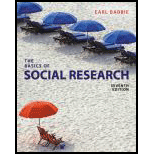
Introduction:
Open-ended questions allow respondents to answer in their own words and provide more detailed background information. These permit more insight into a person, but are more difficult to quantify. Closed-ended questions offer limited choices to respondents, but can be categorized, analyzed, and interpreted more quickly and easily.
Explanation of Solution
Answer and explanation:
(This question requires a subjective answer, this is an example.)
To convert open-ended questions to closed-ended questions, it is necessary to limit the choices open to respondents in order to gather data that can be more readily compared to others and quantified.
“What was your family’s total income last year?” is an open-ended question that would be converted to a closed ended question like this: “Choose the level of your family’s total income last year. a) below $50,000; b) $50,000 - $100,000; c) $100,000-$250,000; d) over $250,00.”
“How do you feel about the space shuttle program?” becomes:
“Please rate your attitude about the space shuttle program on a scale from 1 (strongly oppose) to 5 (strongly support).”
“How important is religion in your life?” becomes:
“Please rate the importance of religion in your life on a scale from 1 (irrelevant) to 10 (most important)”
“What was your main reason for attending college?” becomes:
“Which one of the following is your main reason for attending college? a) to earn more money later; b) to quench my thirst for knowledge; c) my family expects me to go to college; d) it is a way to break the cycle of poverty in my family; e) to play sports, hoping to become a professional athlete”
“What do you feel is the biggest problem facing your community?” becomes:
“Which of these problems is the biggest one facing your community? a) police brutality; b) institutionalized sexism; c) lack of access to quality education; d) climate change”
Want to see more full solutions like this?
Chapter 9 Solutions
The Basics of Social Research (MindTap Course List)
- Simple/ humanized answers: How has the field of education for students with visual impairments (low vision and blindness) evolved? What is the definition of “visual impairment,” how are students identified, and what are the typical causes of visual impairments? Why is early intervention so critical for children with visual impairments, and how can families support children with visual impairments? What are some specific concerns for culturally and/or linguistically diverse children with visual impairments? What kinds of educational responses are needed to address the needs of students with visual impairments?arrow_forwardWould elections have more third-party success if the US had ranked-choice voting nationwide?arrow_forwardAnswer grammararrow_forward
- Would elections have more third-party success if we had ranked-choice voting nationwide?arrow_forwardHow do minor parties influence the U.S. electoral system?arrow_forwardeelancer X English task 1.pdf - Google Driv X kq_A8Yyhcg5Muq83vtY5jmlvjd6ITE/view + Open with Google Docs Task Requirements: Word Count: 300-400 Formatting Style: MLA (for more information click here) *** A minimum of 1 reliable source must be used! Any sources must be properly cited according to the formatting style assigned Many people disagree about the appropriate age to allow children and young adults to use social media. Write an essay that argues your viewpoint about the issue. Develop your claim with reasons and evidence, and form a rebuttal to argue against a counterclaim. Page 1 / 1 Q + 26°C Mcarrow_forward
- DCS cans certification exam answers micaharrow_forwardDescribe a business that has used backcasting or scenarios to assess a situation and then developed a strategy to achieve their goals? what are the obstacles they faced ?arrow_forwardWhy could Backcasting be considered the most useful futuring method? how does the use of modules and simulations relate to futuring? is this method effective?arrow_forward
- "Literature is able to challenge perceptions by capturing the voices of frequently silenced characters". In the light of this comment show how Alexander Masters is successful in promoting Stuart's voice in Stuart: Alfie backwards. Include any quotes which are relevant.arrow_forwardBased on the Practical Foresight GuideLinks to an external site.: select ONE of the futuring methods from the guide and apply it to the Partners in Care problem. PROBLEM to SOLVE from Partners in Care: Increase number of face-to-face/in-person volunteers! As a growing nonprofit, Partners in Care increased the number of virtual volunteers during the pandemic. However, they need more face-to-face (in person) volunteers to help with driving clients to appointments and handyman work. Along with these solutions, they would love to have creative ways to recruit young volunteers to support social media and communication needs. short-term (within the next 3 months) long-term (within the next 2 years)arrow_forwardIf you had to choose one futuring method, which one would be the most useful and why?arrow_forward
 Social Psychology (10th Edition)SociologyISBN:9780134641287Author:Elliot Aronson, Timothy D. Wilson, Robin M. Akert, Samuel R. SommersPublisher:Pearson College Div
Social Psychology (10th Edition)SociologyISBN:9780134641287Author:Elliot Aronson, Timothy D. Wilson, Robin M. Akert, Samuel R. SommersPublisher:Pearson College Div Introduction to Sociology (Eleventh Edition)SociologyISBN:9780393639407Author:Deborah Carr, Anthony Giddens, Mitchell Duneier, Richard P. AppelbaumPublisher:W. W. Norton & Company
Introduction to Sociology (Eleventh Edition)SociologyISBN:9780393639407Author:Deborah Carr, Anthony Giddens, Mitchell Duneier, Richard P. AppelbaumPublisher:W. W. Norton & Company The Basics of Social Research (MindTap Course Lis...SociologyISBN:9781305503076Author:Earl R. BabbiePublisher:Cengage Learning
The Basics of Social Research (MindTap Course Lis...SociologyISBN:9781305503076Author:Earl R. BabbiePublisher:Cengage Learning Criminalistics: An Introduction to Forensic Scien...SociologyISBN:9780134477596Author:Saferstein, RichardPublisher:PEARSON
Criminalistics: An Introduction to Forensic Scien...SociologyISBN:9780134477596Author:Saferstein, RichardPublisher:PEARSON Sociology: A Down-to-Earth Approach (13th Edition)SociologyISBN:9780134205571Author:James M. HenslinPublisher:PEARSON
Sociology: A Down-to-Earth Approach (13th Edition)SociologyISBN:9780134205571Author:James M. HenslinPublisher:PEARSON Society: The Basics (14th Edition)SociologyISBN:9780134206325Author:John J. MacionisPublisher:PEARSON
Society: The Basics (14th Edition)SociologyISBN:9780134206325Author:John J. MacionisPublisher:PEARSON





